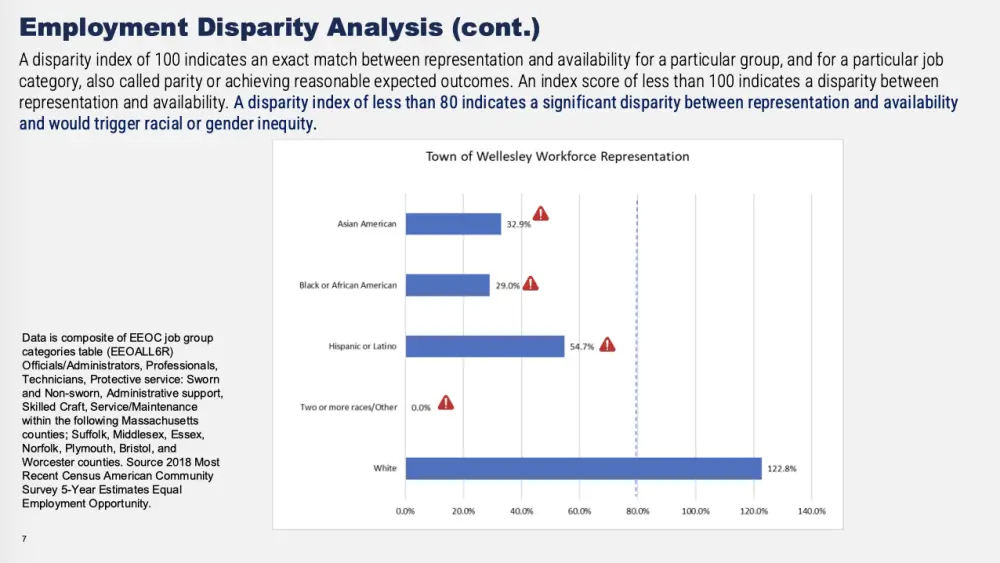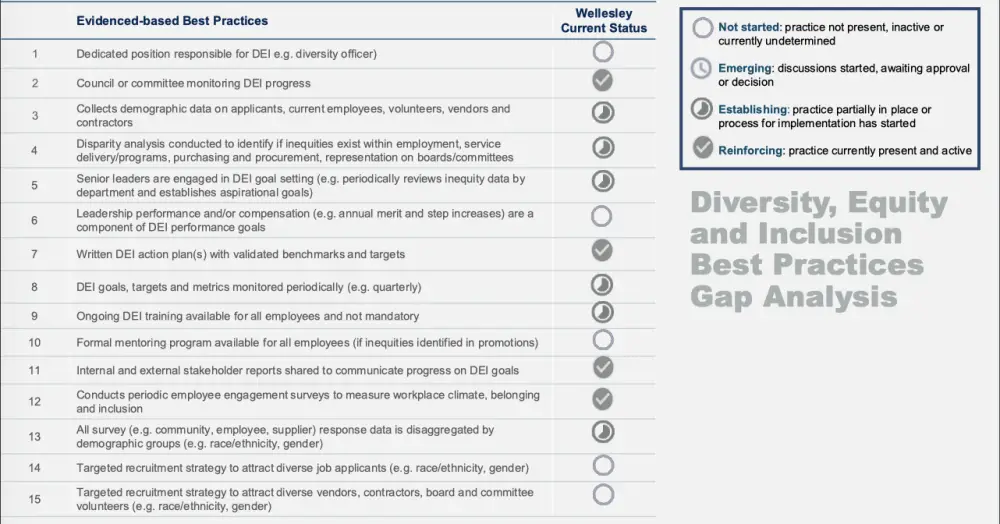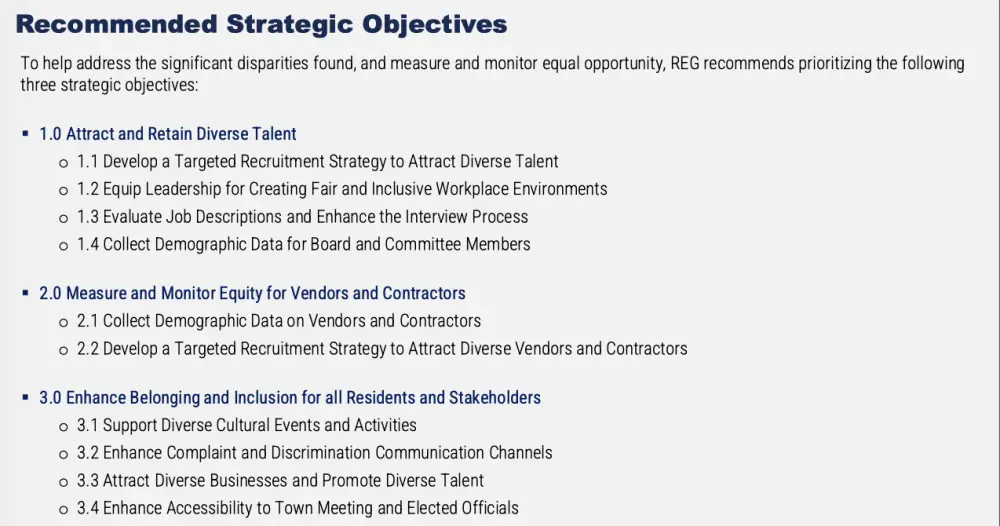Wellesley shares equity audit results against backdrop of changing political climate
A consultant this week shared results of a Wellesley Town Meeting-approved $100K equity audit that examines the levels of opportunity for those looking to work for or do business with the town and for those seeking to take advantage of town services and participate in local government. The audit grew out of previous steps made by the town that included issuing an anti-racism and anti-bias statement and establishing a DEI Task Force
Racial Equity Group’s Bird Guess went over results of the audit—based on surveys, focus groups, and research—with the Select Board on Feb. 11 (see Wellesley Media recording of the meeting, about 27 minutes in). The data collected gives the town a benchmark to use going forward to mark progress on this front. You can find the resulting 64-page report in the Select Board meeting agenda document and expect it soon to arrive on town’s Equity Audit webpage.
Guess addressed the elephant in the room right away: The current political climate regarding diversity, equity, inclusion, and accessibility policies and practices in government and other institutions. He cited executive orders issued by the new federal administration designed to give it “leverage in terms of going against DEIA programs.” He made the distinction, however, between illegal programs that violate federal discrimination laws and the work that Wellesley has done on this audit, which he assured does not break such rules. He also cited a pending lawsuit related to the executive orders that could provide further clarity on how DEI programs proceed.
The audit, which included some initial leadership training on DEI, sought to answer questions about equal opportunity to work for the town or do business with it as a vendor. It also looked at whether everyone has a fair shot at accessing town services and participating in town government. The goal was to make recommendations and outline an action plan based on results.
“We all have inherited a society that has exclusionary policies for demographic groups… So how do we work together collaboratively now to create solutions to try to make sure that there’s equal opportunity for everyone,” Guess said.
The consulting firm aimed to identify where disparities between groups exist, and whether the disparities are significant enough to result in inequities. From there it made recommendations for removing intentional or unintentional barriers and adopting best practices.
On the town employment front, Racial Equity Group looked at the available pool of candidates, by race/ethnicity, within a reasonable distance and compared that to the town’s workforce make-up. It found, for example, that 73.4% of the “reasonable recruitment” area for people working in local government or seeking jobs in local government consisted of white people and that more than 90% of Wellesley’s workforce is white. “This represents an opportunity for expanded outreach” to other demographic groups, Guess said, emphasizing that the goal is not to reach any quota, which would be illegal.
The research also found males to be overrepresented vs. females in the town’s management positions, while females are overrepresented among office and clerical positions. Age and sexual orientation data was not available to do analysis on those demographics.

In a survey of town employees (168 answered out of 500 invited), the consulting firm sought to get a baseline measurement of the town’s commitment to DEI, in part to identify possible training opportunities. The survey found significant gaps between consensus among white employees and those of color, though only 14 people of color answered vs. 118 white employees (a few dozen did not identify their race or ethnicity). The survey detected some concerning results on the matter of employees witnessing or experiencing unfair treatment based on gender, race, and other demographics.
The audit tried to look at who (vendors, contractors) the town is doing business with based on demographics, but the town doesn’t collect that data. More than 71% of available procurement partners are owned by white males, according to a previous disparity study. Racial Equity Group recommends that Wellesley start tracking data on its end to allow for disparity analysis to be made in the future.
Similarly, Wellesley doesn’t collect demographic data on volunteer board and committee members, stymieing disparity analysis for now. The town could ask for this data in the future; Wellesley can make the sharing of demographic data by board and committee members voluntary, though Guess said people will tend to share it if they know what it’s being collected for. This data, once collected, would be compared to the town’s overall demographic data. In comments following Guess’s presentation, Select Board members and Guess raised ideas about ways to possibly get a broader demographic representation involved in local government activities.
The community feedback portion of the audit, based in part on a survey sent in 5,582 utility bills and filled out by 974 people, involved asking a couple dozen questions, including about everything from access to affordable housing to access to quality library services. The demographics among survey takers was blurrier on race/ethnicity than for the other survey, as nearly 40% didn’t volunteer that information. Results are shown for other demographics, including age and wealth. Community focus group and survey data was consistent on some issues where racial/ethnic groups differed significantly in their responses.
Additional Freedom of Information Act requests uncovered examples of complaints filed with the state against landlords who appeared to discriminate, more than likely, based on source of income, Guess said. The consulting firm has recommended that the town engage with landlords and property owners to let them know such behavior won’t be tolerated.
In rounding things out, Racial Equity Group looked at how the town stacks up in adhering to best practices for supporting equal opportunities. While Wellesley lacks a dedicated diversity officer and mentoring program, it does have written DEI action plans and a group monitoring DEI progress.

Racial Equity Group recommends that the town retain its DEI Task Force/Committee to help Wellesley follow through on its advised action plans. The package delivered by the consultancy includes model policies that the town can adopt.

Select Board Chair Colette Aufranc noted after Guess’s presentation that the Board has on its work plan a number of initiatives that line up with Racial Equity Group’s recommendations. These include improved communication approaches and efforts to broaden cultural celebrations. She pointed out that initiatives will be undertaken by the Board, other town bodies, and department heads, and that resources such as funding and bandwidth will need to be balanced to address DEI as well as other work in town.
Select Board member Lise Olney said she has been getting questions from members of the public of late about how Wellesley might respond to the current broader political environment and whether the town might ditch its DEI efforts. “I think this action plan is really the answer to those questions. It provides such clear direction on what we can do next,” she said.
There was also talk of holding a future webinar with Guess to allow members of the public to ask questions and comment on the audit results.
Please help us grow by:
- Sharing news tips: natickreport@gmail.com
- Encouraging local businesses & organizations advertise on our site
- Contributing to support our work if you can. This is our actual job.